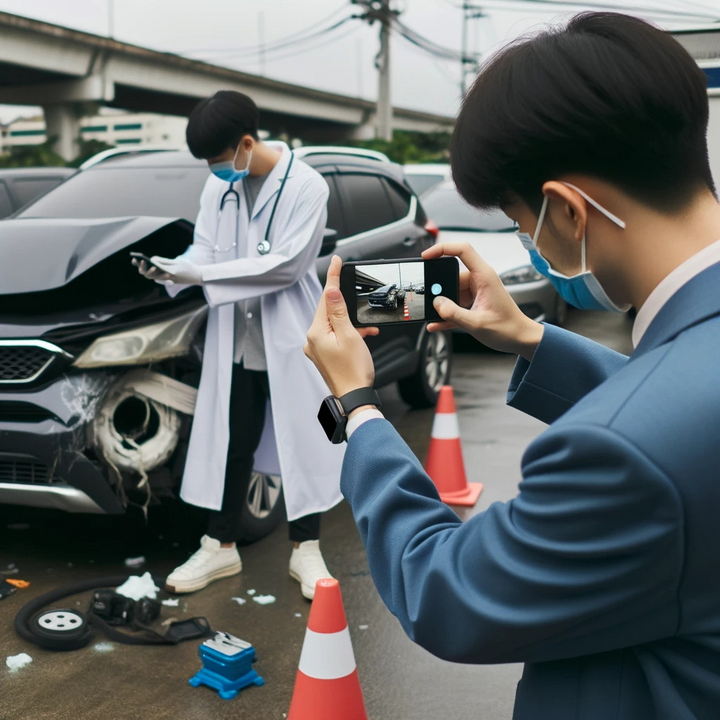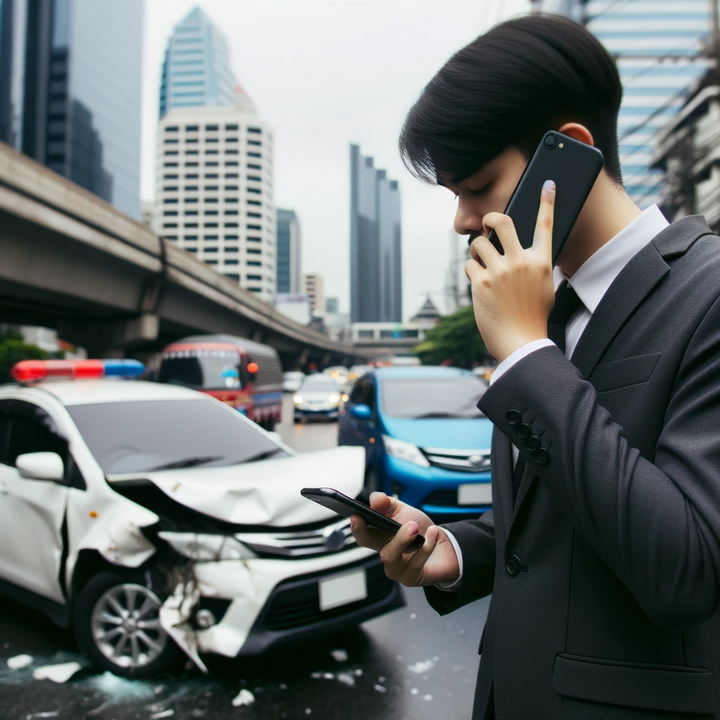Accidents are terrifying experiences. At the very moment of a car accident, a series of events take place that can leave a person physically and mentally scarred. When two vehicles collide, the human body undergoes immense force, often leading to injuries both visible and hidden. Rapid deceleration, a common occurrence in crashes, can cause the body to lunge forward, potentially leading to whiplash and other related injuries. Internal organs, despite being cushioned by fluid and protective barriers, can still be damaged due to the sudden force. Even if someone seems fine externally, they could be bleeding internally or may have sustained concussions.
Seatbelts, although life-saving, can also contribute to specific injuries during a high-impact collision. The force can cause bruising and fractures where the belt holds you. And let’s not forget the psychological trauma. Many survivors of auto accidents grapple with anxiety, PTSD, and other mental health concerns long after the physical wounds have healed.
Understanding the potential consequences of a car collision is essential. But just as crucial is knowing the steps to take (and the mistakes to avoid) post-accident. This understanding leads us to explore the 10 most common mistakes to avoid after a car accident, ensuring you’re not just safeguarding your health but also your legal and financial well-being.
10 – The Blame Game: The Pitfall of Admitting Fault
In the immediate aftermath of a car accident, emotions run high. Shock, guilt, and panic can easily blur our judgment. While it’s human nature to want to apologize or accept blame, especially if you think you caused the accident, doing so can have serious repercussions on your car accident case.
By admitting fault, you’re effectively handing the insurance company a golden ticket to reduce or even deny your compensation. Remember, determining liability in a crash involves various factors: eyewitness testimonies, police reports, forensic evidence, and more. Even if you think you’re at fault, there might be underlying circumstances that prove otherwise.
Moreover, in legal terms, admitting guilt can be seen as an official statement. This can drastically influence any subsequent legal proceedings. Instead of admitting fault, focus on ensuring everyone is safe, gather the necessary details, and let the professionals – police, lawyers, and insurance adjusters – handle the blame game.
09 – Digital Footprints: The Snare of Social Media Posts
In today’s hyper-connected world, sharing our lives on social media is second nature. But in the wake of an auto accident, it’s essential to exercise caution. Your online posts, innocent as they may seem, can come back to haunt you during claims or legal proceedings.
Consider this: You’ve been in a crash and have claimed injuries. Later that week, you post a picture of yourself hiking or doing any physical activity. The insurance company could leverage this against you, arguing that your injuries aren’t as severe as you claim.
Comments about the accident, even if they’re vague or non-specific, can be misconstrued or taken out of context. An innocent post saying, “Had a rough day with a minor fender bender” might be used to argue that the accident was minor, influencing the claim’s outcome.
The best course of action? Maintain digital silence. Refrain from discussing or posting anything related to the accident, your injuries, or the event itself until your car accident case is fully resolved.
08 – The Ink Trap: Beware of Signing Unfamiliar Documents
The chaos following a car collision can be overwhelming. Amidst the flurry of paperwork, insurance forms, and official documents, it’s easy to lose track of what you’re signing. This oversight can be detrimental to your rights and claims.
Often, insurance companies may present documents that seem standard but could have clauses limiting your ability to claim or pursue further legal action. By signing without proper understanding or consultation, you might unknowingly waive crucial rights or accept an undervalued settlement.
Always be wary of signing any document without a thorough review. If you’re unsure, it’s always a good idea to consult with a personal injury attorney. They can guide you, ensuring that your interests are protected and that you’re not falling into any legal loopholes.
07 – Stay Put: The Risks of Leaving an Accident Scene
Driving away from an accident, even a minor one, isn’t just morally wrong—it can land you in legal hot water. Depending on jurisdiction, leaving the scene without exchanging information or checking on all parties involved might lead to hefty fines, license suspension, or even jail time.
When an accident occurs, it’s essential to remain on-site. This ensures you’re complying with legal obligations, preserving evidence for your car accident case, and addressing any potential injuries. If safety is a concern due to traffic or another hazard, move to a safer location nearby, but never leave entirely without fulfilling your duties. Remember, a seemingly simple action could escalate into a hit-and-run allegation, impacting future insurance premiums and legal standings.

06 – The Invisible Pain: Overlooking Immediate Injuries
The human body has a fascinating way of masking pain, especially under stressful situations like car accidents. Adrenaline, a hormone released during stressful times, can temporarily suppress pain, making you feel “okay” even when you’re not.
Neglecting to assess injuries can backfire later. Some injuries, especially internal ones or those related to soft tissues, might manifest symptoms hours or even days after the crash. By then, connecting them to the accident can become challenging, weakening your claim.
Always prioritize health. Even if you feel fine, it’s wise to seek a medical check-up after a collision. Not only will this ensure your well-being, but it also creates a medical record linking any injuries directly to the accident—a crucial asset for any auto accident claim.
05 – Silent Sirens: The Oversight of Not Alerting Authorities
In minor accidents, it’s tempting to handle things informally. Exchange details, agree on repairs, and move on—no police needed, right? Wrong. Failing to report a crash can have unforeseen complications down the line.
Contacting the police provides an official record of the incident, lending credibility to your account. They’ll document details, speak to witnesses, and create an accident report—all vital components when dealing with insurance companies or legal proceedings.
Moreover, in some regions, failing to report specific types of accidents is a breach of law. Protect yourself from potential legal headaches and ensure that there’s an unbiased account of the incident by always calling the authorities, no matter the accident’s severity.
04 – Snapshots as Evidence: The Importance of Taking Pictures
In today’s digital age, most of us have smartphones equipped with cameras. These tools can prove invaluable following an auto collision. Photos provide tangible, date-stamped evidence that can corroborate your account of the incident.
From skid marks to vehicle damage, road signs, and even weather conditions, capturing as much detail as possible can make a difference in establishing fault. This visual proof is compelling when communicating with car accident adjusters or in court proceedings. Beyond just snapping photos of damage, consider broad scene shots, any visible injuries, and license plates.
Not having photographic evidence can sometimes turn a clear-cut case murky, potentially reducing the compensation you might be eligible for. In essence, your phone’s camera is one of your primary tools for protecting your rights and interests after an accident.
03 – Navigate the Legal Labyrinth: The Need for a Personal Injury Lawyer
Many may wonder if hiring a personal injury attorney is overkill following a minor accident. However, the legal intricacies tied to auto accidents are often complex, even in seemingly straightforward situations. Lawyers provide guidance, ensuring your rights are protected, especially when the at-fault party is disputing their role or if injury claims arise.
Remember, insurance companies are businesses first. Their aim is often to minimize payouts, which can mean exploiting any lack of legal know-how on your part. Having a seasoned attorney can help level the playing field, ensuring you receive fair treatment and compensation. Especially in scenarios with significant injuries, long-term implications, or loss of work, a legal expert can prove invaluable.

02 – Clear Communication: Reporting to Your Insurance Provider
Though it might seem intuitive to report a car crash to your insurer, it’s surprising how many skip or delay this crucial step. Every life insurance policy has a clause necessitating prompt reporting of any accident. Delays can raise suspicions or even violate policy terms, leading to claim denials.
Furthermore, swift reporting initiates the claims process, setting the stage for vehicle repairs, medical bill payments, or other covered expenses. Having a record of the accident with your insurance also helps if the other involved party decides to make a claim.
However, when speaking with any insurance adjuster, it’s essential to stick to facts. Speculating about fault or downplaying injuries can inadvertently harm your claim.
01 – Immediate Gratification or Long-Term Assurance? The Pitfall of Accepting Quick Settlements
In the chaotic aftermath of a car crash, receiving an offer for a quick settlement from an insurance company might seem like a silver lining. But, in many cases, what looks like an act of goodwill is often a strategic move to minimize payout.
Quick settlements tend to appear soon after the accident, capitalizing on a victim’s potential financial stress or emotional distress. It’s tempting. Bills are mounting, your vehicle might be out of commission, and the promise of immediate funds can look like a lifeline.
But here’s the catch: Once you accept, you waive any right to pursue further compensation. And many accident-related expenses – like subsequent medical treatments or hidden vehicle damages – manifest down the line. Moreover, injuries sometimes have delayed symptoms. Today’s mild discomfort could be tomorrow’s chronic pain, and if you’ve already settled, you’re on the hook for these unforeseen costs.
A personal injury attorney can evaluate the true value of your claim, ensuring all potential costs are accounted for. It’s not about greed; it’s about fair compensation. So, before signing on that dotted line, consider all implications. Because an immediate small sum might cost you more in the long run.
Crucial Statistics: When and Where Accidents Strike the Most
Our daily routines often blind us to the lurking dangers of the road. But when do car accidents happen the most? Research indicates that a significant portion of accidents occurs during rush hours, typically between 3 pm and 6 pm. This period sees a blend of hurried employees, school buses, and general congestion, making it a prime time for mishaps.
Weekends, especially Saturday nights, are another hotspot. A mix of relaxed attitudes, alcohol consumption, and late-night drives elevate the risk. Weather conditions, too, play a crucial role. For instance, the first rain after a dry spell can make roads slick, resulting in higher accident rates.
But where are these accidents most likely? Intersections are notorious for collisions, thanks to the blend of turning, merging, and stopping vehicles. Residential areas, surprisingly, aren’t far behind, with the false security of familiar territory leading to many an accident case. Highways, with their high speeds and large vehicles, are also prime locations for devastating accidents.
With these statistics in hand, one can’t help but stress the importance of vigilance and safe driving habits. Every time you’re behind the wheel, you have not only your life but also the lives of others in your hands.
Unraveling the Cause: Decoding Accident Triggers
Accidents don’t just happen; there’s always a reason, a trigger. Identifying the cause of an auto accident can be as straightforward as a driver running a red light or as complex as piecing together witness accounts, vehicle damage patterns, and environmental factors.
Forensic analysis often comes into play, especially in multi-vehicle pile-ups or when the cause isn’t immediately apparent. Skid marks, vehicle positioning, and even debris can provide invaluable insights into the sequence of events leading to the crash.
Modern cars, equipped with onboard computers, store a plethora of information that can be retrieved post-accident. This data can reveal details like speed, brake application, and steering angle moments before the collision.
Witness testimonies are equally vital. Bystanders, other drivers, or even storefront surveillance cameras can offer a third-party perspective, free from the potential bias of the involved parties.
In the realm of personal injury attorney cases, the identified cause can significantly influence the outcome. It can determine fault, impacting insurance claims and potential lawsuits. As drivers and responsible citizens, understanding these causes is paramount. It not only aids in post-accident procedures but also inculcates preventive measures, ensuring safer roads for all.


